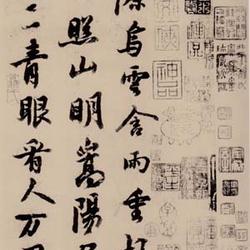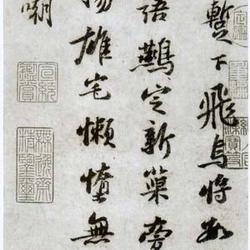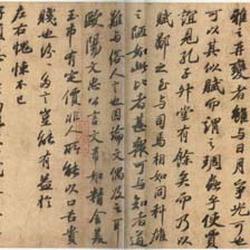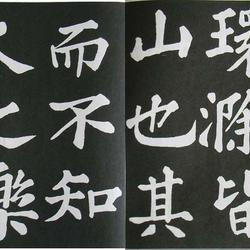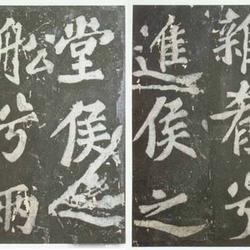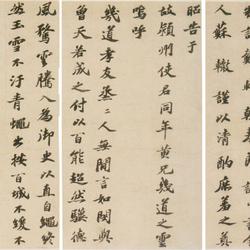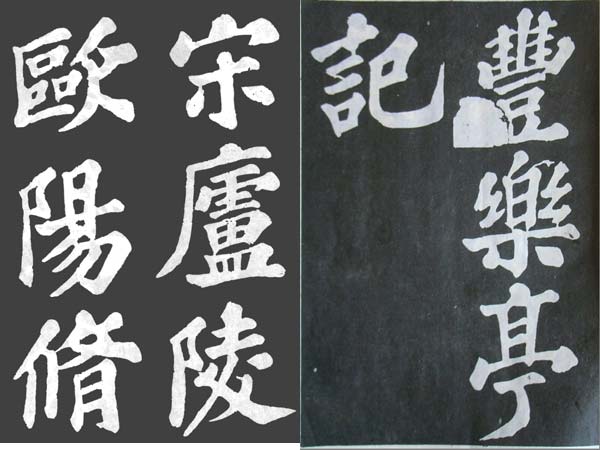
"The Story of Fengle Pavilion" was written by Ouyang Xiu and written in regular script by Su Shi. The original stone was carved in the sixth year of Yuanyou in the Northern Song Dynasty (AD 1091) and has been lost. It was re-engraved during the Jiajing period of the Ming Dynasty. This stele is one of Su Shi's calligraphy masterpieces in his later years. The predecessors said that "the body is Zhuangan and the atmosphere is graceful", which is indeed appropriate. There is a little meaning in the regular script of the font, and it has the characteristics of "the pen is round and the rhyme is winning". Wang Shizhen of the Ming Dynasty commented on him as "Zhenqing, Xu Hao, although his body is small and slow, but he is majestic and handsome", which can be confirmed in this monument.
The original Song rubbings of the tablets written by Su are extremely rare. "Fengle Pavilion Ji" is a masterpiece of Po Weng's regular script in his prime years. Zhu Deyi in the postscript of this book published by Chengdu Ancient Books Bookstore believes that it is a Song Dynasty copy, and there are also The inscriptions and postscripts by Luo Zhenyu, Wu Hufan, Chen Chengxiu, Huang Baoshu, etc. are full of spirit and spirit, far better than recent publications printed from Ming Dynasty reprints.
Appendix: Original text of Ouyang Xiu's "Fengle Pavilion":
After Xiu has cured Chu, next summer, he begins to drink Chu water and it is sweet. Asking people from Chuzhou, they found it was a hundred steps away in the south of the state. Above it is the Fengshan Mountain, towering but standing tall; below it is the valley, slim but deep; in the middle there is a clear spring, dilapidated but rising up. Look up and down, take pleasure in it. So the springs were dug out, stones were cut out, and the land was used as a pavilion, and people from Chuzhou went there to swim there.
Chu was used in the wars of the Five Dynasties. In the past, Emperor Taizu used the Zhou army to defeat Li Jing's 150,000 soldiers at the foot of Qingliu Mountain. He captured Huangfu Hui and Yao Feng alive outside the east gate of Chu, and then defeated Chu. Xiu tried to examine the mountains and rivers, and according to the pictures, he raised the pass to look at the clear stream, and he wanted to catch the brilliance and phoenix. Therefore, all the old people are gone, and the world has been peaceful for a long time.
Since the Tang Dynasty lost its power, the country has been divided, and heroes have risen up to fight. How can we count those who are in the enemy's country? In the Song Dynasty, after receiving the destiny, saints came out from all over the world. Xiangzhi relies on dangers and obstacles, shovels and wastes away. In a hundred years, he can only see the mountains are high and the water is clear. I want to ask about it, but the old man is gone. Now Chujie is between the Yangtze and Huaihe Rivers, and there are merchants and merchants in boats and carriages. Guests from all directions are not allowed to come, and the people live without any foreign affairs, but content themselves with food and clothing, enjoying life and dying. But who knows how to recuperate and regenerate the merits and virtues that last for hundreds of years?
When Xiuzhi came here, he liked the remoteness of the place and the simplicity of things, and he also loved the ease of the world. Now that the spring is located in the valley, Nairi and the people of Chu can look up at the mountains and listen to the spring. The trees are shaded by the fragrance, and the wind, frost, ice and snow make the dew look delicate and beautiful. The scenery of the four seasons is all lovely. Fortunately, the people enjoy the abundance of food and are happy to travel with me, because the mountains and rivers and the beauty of their customs make the people know that those who enjoy the prosperity of the years are lucky to live in peace.
The husband proclaims his kindness to share happiness with the people, which is also the matter of governor. So he wrote and named his pavilion Yan.

